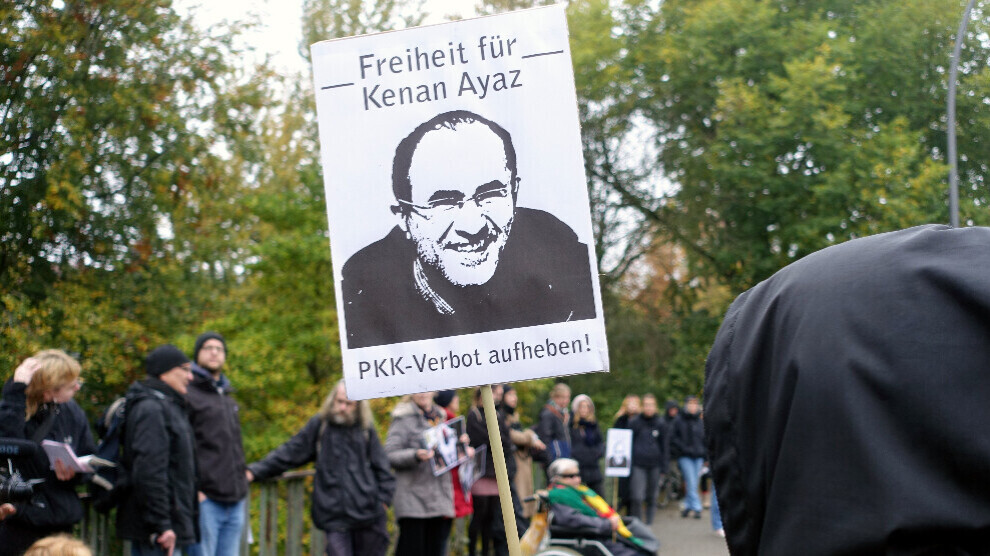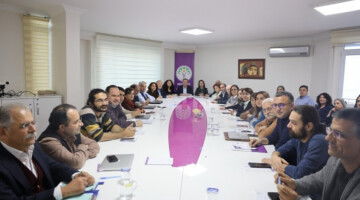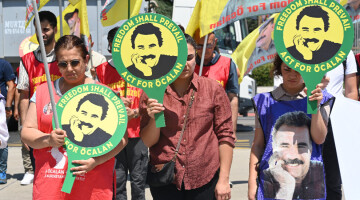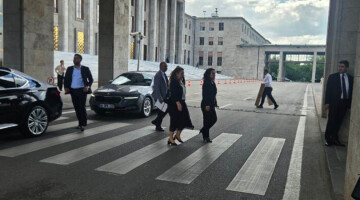TRIAL OF KURDS IN GERMANY
Right at the beginning of the 21st day of the trial against Kenan Ayaz at the Hamburg Higher Regional Court on March 12, 2024, presiding judge Wende-Spohrs made it clear what she wanted to do with this trial: demonstrate her position of power - to Kenan Ayaz, his defense and the visitors.
As on many other days of the trial, a number of people showed their solidarity with Kenan Ayaz, exercising their right in this public trial. This seemed to provoke the presiding judge. She had reacted aggressively several times in the past when the audience was seemingly to noisy or if someone from the audience pointed out that they could not properly hear due to lack of volume. This was also the case on that day when the court's decision was read out that Kenan Ayaz was not allowed to finish his statement on the expert opinion of Dr. Günter Seufert.
It seems grotesque, almost like a real-life satire, if you can imagine what happened next: the judge reacted to the above-mentioned announcement by shouting that the person in the audience had to be quiet. After all, she had tested the acoustics of the room herself. She did not say under what circumstances she had tested it. In any case, she could not be heard that morning. This is most likely due to the fact that the technology is inadequate and the visitors have to sit behind a glass panel. The audience again pointed out the volume problem. The judge took this as an opportunity to threaten to fine them if they continued to speak. A member of the defense team then took the floor and was promptly interrupted loudly by Wende-Spohrs. She withdrew the lawyer's right to speak and said he was not allowed to interrupt her reading of the decision. Since the lawyer only tried to point out the audience could not hear properly the second defense lawyer criticized that he was not allowed to speak. Upon this, the judge loudly pointed out that she also did not have the floor at the moment and accused her of being hard of hearing. But that was not enough! After the lawyer again objected that her colleague was not allowed to speak, the judge shouted at her: "You shut up now!" The other attorney rightly took this as an insult, articulated it, and asked for a recess. Wende-Spohrs again shouted at the defense team that they did not have the floor.
Court revokes Kenan Ayaz's right to speak
The judge then read the court's order prohibiting Kenan Ayaz from reading the remaining pages of his statement dealing with the testimony of the expert witness, Dr. Seufert. This part of her reading was now easier to understand. Apparently, the audience's intervention had been heard and the judge made more effort to speak loudly and clearly. The day before the presiding judge had already threatened Kenan Ayaz that he would be deprived of his right to speak. The judge alleged that Kenan Ayaz’ expressed his own opinion in his statement and explained his own knowledge about the Kurdish-Turkish conflict instead of only dealing with the expert's statement. However, even the representative of the Office of the Federal Public Prosecutor argued that Kenan Ayaz should be allowed to continue his testimony. This was done by the prosecution in the hope that "further statements would make concrete reference to the expert opinion".
But once again, the stand of the court was harsher than that of the prosecution and would not allow Kenan to continue his testimony. He had only 10 pages left out of the 40 pages of testimony. The reason given for the court order was that the statement "for the most part [did] not refer to the statements of the expert witness Dr. Seufert in a sufficiently concrete way, but [...] mainly consisted of a series of political statements, his own opinions and his own assessments of the Turkish-Kurdish conflict”. And it further alleged that the only aim of Kenan Ayaz was to give his own expert opinion "on the role of the PKK” and which was – in the opinion of the court - also expressed in Kenan Ayas question to the judged: “Why don't you want to hear something about the Kurds from a Kurd?” This decision and the reason given by court only illustrates the bias of the court on the one hand and the anti-Kurdish racism towards Kenan Ayaz on the other hand.
Motion to recuse the judges, the second
As expected, after what had happened the defense filed the second motion on behalf of Kenan Ayas to dismiss the panel of three judges for showing bias against him. The defense lawyers claimed on behalf of Kenan Ayas that he had "justified reasons to doubt the impartiality of the rejected judges".
This was substantiated by the decision not to allow Kenan Ayas to finish his statement on the testimony of the expert witness and by the behavior of the presiding judge, who shouted at the representatives of the public and the defense team and her language used towards the lawyers that was "completely inappropriate and ultimately insulting". The defense further explained in detail why the decision to stop Kenan Ayas from speaking was not only unlawful, but also showed the bias of the judges, as Kenan Ayas had repeatedly taken great pains to explain to the court how his statement was related to the testimony of the expert witness. It seemed to the audience that the problem was not Kenan Ayas' testimony, but that the court had no knowledge about the history of the Kurdish struggle and the repression it suffered by the Turkish state and therefore could not understand the sometimes inexplicit ways in which Kenan Ayas' testimony dealt with the testimony of the expert witness. The defense also pointed out that Kenan Ayas compared old public statements of the expert witness with his testimony in court. They said that Kenan Ayas was only pointing out that these old statements and writings were a mostly accurate description of the conflict and that there was no apparent reason why the expert witness had changed his analyses when he came before the court. As Kenan Ayaz had pointed out the expert witness now described the conflict in line with the prosecution.
At the end of the trial day, the defense began to file an extensive motion attacking the political nature of the trial and the prosecution's case. As this could not be completed, the trial will continue on March 20.













